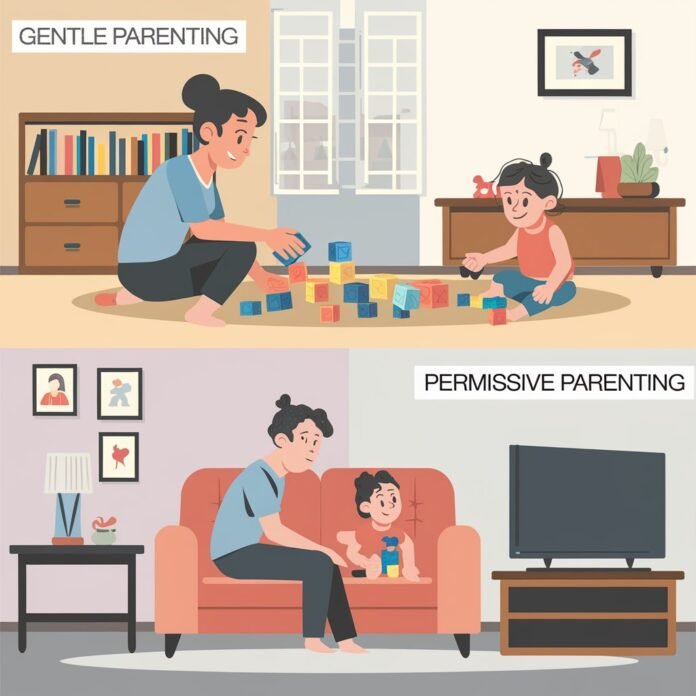Parenting styles significantly impact a child’s development, shaping their emotional, social, and psychological well-being. Among the many approaches, gentle parenting and permissive parenting often come up in conversations. While they may seem similar at a glance, they differ profoundly in philosophy and execution. This article will explore the key differences, benefits, and strategies of these two parenting styles to help you make informed decisions for your family.
What is Gentle Parenting vs Permissive Parenting?
Gentle Parenting is an evidence-based approach that emphasizes empathy, respect, and understanding. It focuses on building a strong parent-child connection through positive reinforcement and open communication. Gentle parents set clear boundaries and maintain consistent discipline while addressing their child’s needs with patience and kindness.
Permissive Parenting, on the other hand, is characterized by a lack of boundaries and discipline. Permissive parents are indulgent, often giving in to their child’s desires to avoid conflict. This approach prioritizes the child’s happiness in the short term but often at the expense of structure and accountability.
Benefits and Drawbacks of Gentle Parenting vs Permissive Parenting
Gentle Parenting Benefits:
- Encourages emotional intelligence and self-regulation.
- Strengthens the parent-child bond.
- Promotes independence and problem-solving skills.
- Leads to well-rounded, respectful individuals.
Drawbacks of Gentle Parenting:
- Requires time, patience, and consistent effort.
- Can be challenging to implement without support or guidance.
Permissive Parenting Benefits:
- Creates a relaxed, low-conflict environment.
- Fosters a sense of freedom and individuality in children.
Drawbacks of Permissive Parenting:
- Often results in a lack of discipline and accountability.
- Can lead to behavioral issues and poor decision-making.
- May hinder the development of emotional regulation.
Tips for Implementing Gentle Parenting
If you’re considering gentle parenting, here are some actionable tips to guide you:
- Set Clear Boundaries:
- Define household rules and explain their importance to your child.
- Be consistent in enforcing these boundaries with empathy.
- Practice Active Listening:
- Pay attention to your child’s feelings and validate their emotions.
- Use phrases like “I understand” or “That must be hard for you.”
- Use Positive Reinforcement:
- Reward desirable behaviors with praise or small incentives.
- Focus on building good habits rather than punishing bad ones.
- Model Desired Behaviors:
- Demonstrate kindness, patience, and respect in your interactions.
- Children often emulate their parents’ actions.
- Practice Patience:
- Change takes time; be patient with yourself and your child.
- Seek support from parenting groups or resources if needed.
Imagine your child refuses to do their homework. Here’s how each approach might handle the situation:
- Gentle Parenting: You sit down with your child, acknowledge their feelings, and collaboratively create a plan to tackle the task. You explain the importance of responsibility and offer support.
- Permissive Parenting: You allow the child to skip homework, reasoning that they’ll handle it later or learn from the natural consequences without intervention.
Key Takeaways
While both parenting styles prioritize the child’s well-being, gentle parenting offers a balanced approach with structure and empathy. Permissive parenting, though well-intentioned, often lacks the boundaries necessary for long-term growth.
By understanding these differences, parents can choose strategies that nurture their child’s emotional and behavioral development effectively.
Conclusion
Gentle parenting and permissive parenting may share an emphasis on kindness, but their methods and outcomes differ greatly. Embracing gentle parenting principles can foster a healthy, respectful relationship with your child while teaching essential life skills. If you’ve found this article helpful, share it with other parents or leave a comment below to share your thoughts and experiences!





